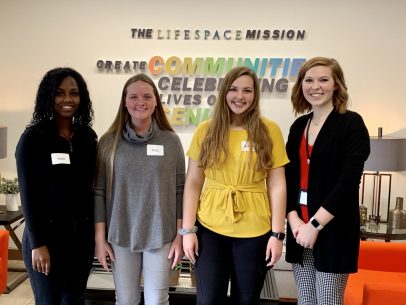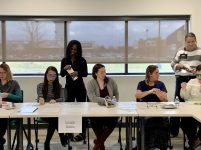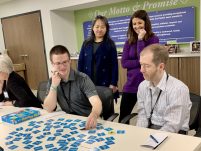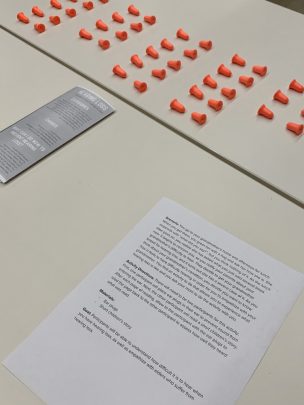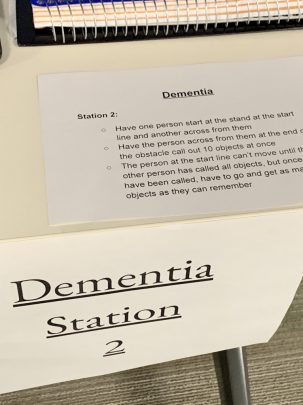Lifespace Communities, Inc. has a mission to celebrate the lives of senior citizens by offering residential living nation-wide. Currently, they have 15 locations in 8 different states and they serve around 5,000 residents. Libby Burken has served as an HR specialist with Lifespace for over a year. She strives to consider the challenges and needs of their residents, and it was this thought process that led her to reach out to Anne Boesen, Exploration of Health Sciences & Medicine instructor, with a project idea for creating an empathy lab. Libby explains, “During a visit to APEX’s Showcase event I encountered an empathy lab that had been set up by APEX associates, and I thought that it would be an excellent idea for our home office. I had worked with Waukee APEX in my previous job, so I knew that it would be a good fit.”
Three members of the APEX Medical and Health Sciences team chose to work with Libby on the Empathy Lab project. Yodit Gebregzaber, Riley Stoltz, and Alizabeth Quass worked together to design and implement five different stations that centered around dementia, vision loss, and hearing loss. These are three chronic conditions and diseases that affect many senior citizens. The lab was designed to help team members understand the industry in a different way by completing everyday tasks in the shoes of someone with memory, vision, and/or hearing impairments. Libby explains “The overarching goal was to have Lifespace team members experience what many of our residents struggle with on a daily basis.”
Three of the five stations focused on the stages of dementia. APEX Student Associates designed several activities in order for their participants to gain empathy for those suffering from dementia. They planned a memory game, an obstacle course that involved a memory component, and a different kind of memory game where guests were shown a poster of items, and then they were tasked with writing down as many as they could remember.
Vision impairment was illustrated when attendees of the empathy lab were asked to try on different pairs of glasses designed to imitate different eye diseases such as macular degeneration and glaucoma. They were then asked to complete a variety of everyday activities that most individuals with these impairments would have difficulty accomplishing.
Finally, hearing loss was represented when guests were asked to wear earplugs and repeat details of a story that was read to them. The purpose of this activity was to replicate the way individuals with hearing loss may hear everyday conversations.
APEX student associates also designed brochures that were handed out at the end of the afternoon. These brochures contained information highlighting what people can do today to age successfully. This included tips for preventing chronic conditions.
Waukee APEX student associates continue their efforts on this valuable project as they work to put together a program guide for the Empathy Lab. The program guide will include materials needed in communications, flyers, pre- and post-assessment as well as a guide for how to facilitate the sensory stations with team members in the community.

